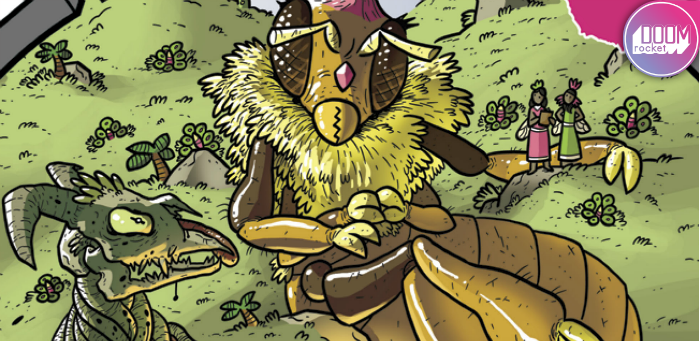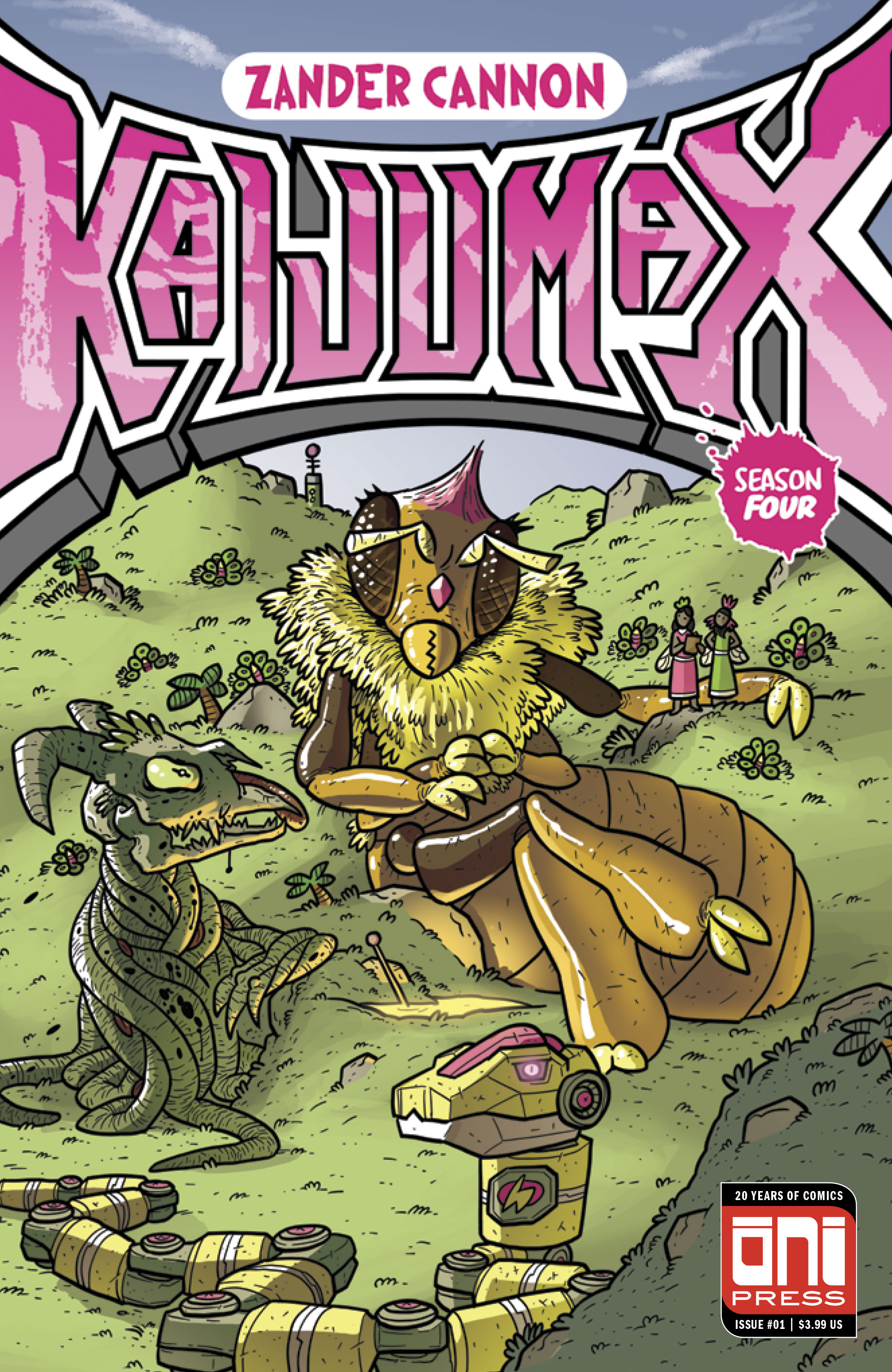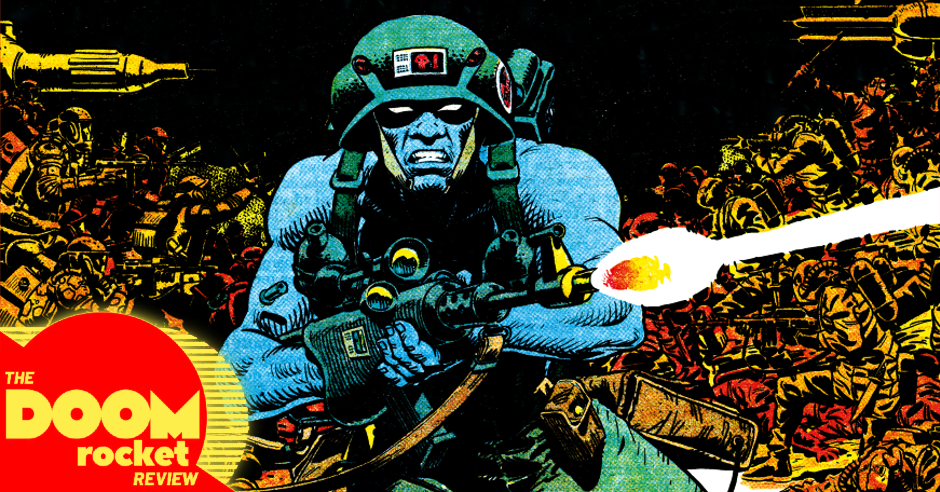THIS REVIEW OF ‘KAIJUMAX SEASON FOUR’ #1 CONTAINS MINOR SPOILERS.
By Jarrod Jones. The inimitable Oni Press series Kaijumax, now in its fourth season (funny how we sometimes use television vernacular when talking about comics), has always mired in the murky grays of ethics and morality. Characters — sometimes human beings, often bizarre monsters — are analogous stand-ins for people from various classes and races, all struggling in a system that has long since failed them. The title is our location, mostly — a super-maximum security prison for “mons” detained by a hyper-militarized police force (in the form of the sleek jaegers seen in anime and manga) and dumped onto an island that seems designed to perpetuate the cycle of violence and despair that put these creatures there in the first place. (Intriguingly, Season Two followed a kaiju released back into society, hopeful for a fresh start but was inevitably lured back into the same damning traps.)
If its premise sounds familiar, that’s because it’s meant to. While at first glance Cannon’s character design and Lisa Frank color palette can give the impression that this is a softer comic, don’t let that trip you up. Kaijumax is as gripping a thesis on the brutal nature of our prison system as Oz was all those years ago. What the series does particularly well is get into the massive head-spaces of its larger-than-mountains cast, giant monsters who’ve committed crimes either out of necessity, spite, unchecked anger, desperation, or something else. Their situations are often complex, because life is complex. But whatever their reasons, every emotion — disappointment and despair, loneliness and fury — every single tremulous shift can be read on the faces Cannon puts on these monsters. (“If you give them feelings, you can see that they pretty much have the lousiest deal,” Cannon told me back in 2016.)
A fourth season for Kaijumax means growth. More of the same? Hardly. The world grows, the cast of characters grows, our understanding shifts and changes. This issue introduces the 6-B wing of the Kaijumax facility, a female prison with its own dilemmas and bureaucratic red tape. We meet the rather progressive-minded Warden Shui, who speaks softly and wields a massive dragon-mechsuit. Cannon initializes arcs for the Goat, a Cthulhan entity punished for the crimes of her cult-like followers, and Dr. Zhang, a prison doctor who killed her abusive convict boyfriend at the end of Season Three, currently stuck in giant-mode.
Zhang’s plight creates an interesting wrinkle in Cannon’s mythology; she’s an exceptionally gifted scientist once considered integral to the prison system, someone who fell into its yawning chasms and became embroiled in the cruel manipulations of an unrepentant criminal. She’s being punished for a crime, but we know how she got there. Our hearts bleed for her. (New readers would do well to get caught up on the series’ preceding 18 issues.) Zhang encounters former co-workers and receives preferential treatment from staff, though her grief has her facing a crippling emotional crisis. It’s another way for Cannon to illustrate that nobody gets away 100% clean in life, that sometimes our emotions betray us, send us spiraling into an abyss few can escape.
Sounds grim, I know. The narrative can be complicated — especially when your own feelings enter into the context — but part of the allure of Kaijumax is its reliance on nuance. Cannon lets his scenarios play out naturally, lets his monsters be, yes, human. If you are familiar with the prison system itself then you’ll recognize the realities this series is attempting to convey. That familiarity conjures feelings of hope as often as it does feelings of inevitability. It’s fascinating. We can sometimes see the wool pulled over characters’ eyes before they do — in this issue’s case the Goat, who’s experiencing drug withdrawals and is desperate for another fix, encounters an ancient being who claims to be one of the island’s original inhabitants but is likely just a very convincing con artist. (This subplot in itself lends an intriguing dimension to Cannon’s story, that the outward appearance of his monsters are deceiving.)
I’m sure Zander Cannon has grown weary of the comparison, but make no mistake — he’s the David Simon of comics. Structured like a certain Peabody-winning HBO melodrama and often just as heartrending, Cannon’s wildly inventive Kaijumax is a scathing polemic on the prison industrial complex, a multifaceted wonder of storytelling, an engrossing kitchen sink melodrama, an unforgettable reading experience.
Oni Press/$3.99
Written by Zander Cannon.
Art by Zander Cannon.
Color assists by Jason Fischer.
Design by Dylan Todd with Zander Cannon.
Edited by Desiree Wilson.
10 out of 10




















